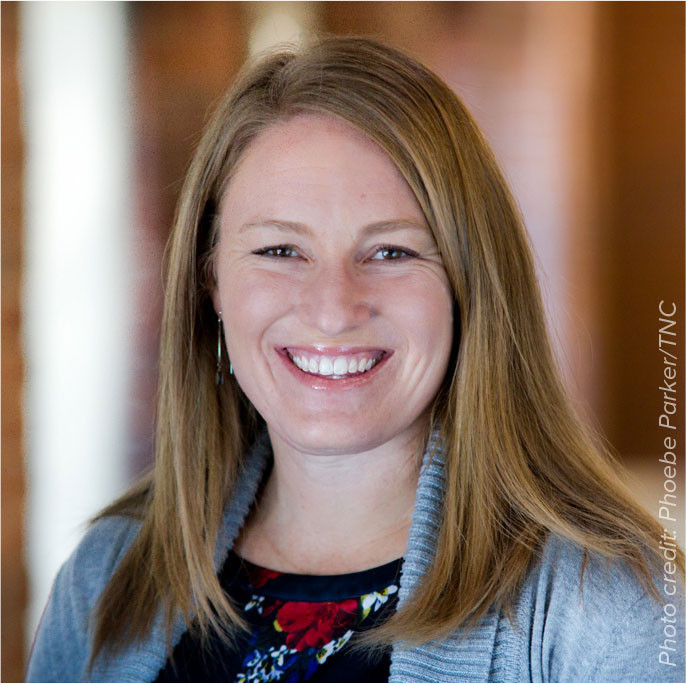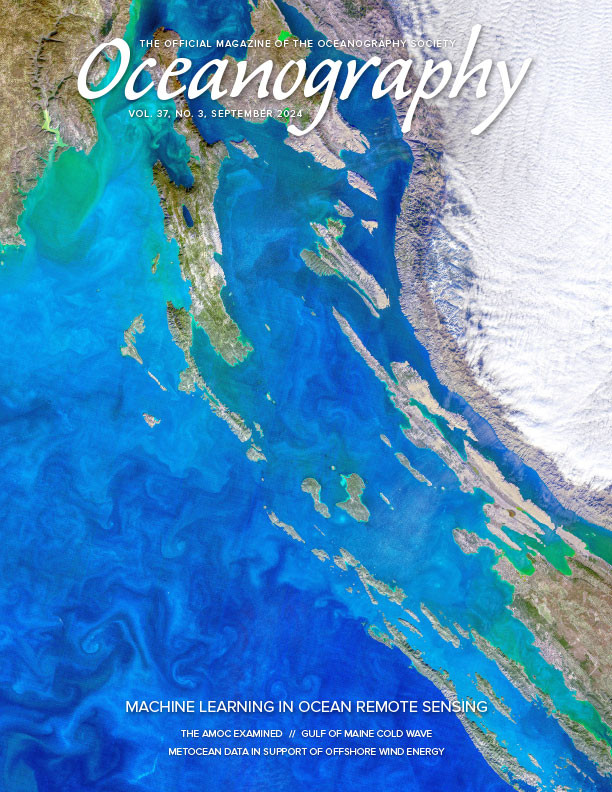Full Text
 |
JOCELYN RUNNEBAUM, Marine Scientist, The Nature Conservancy
Degree: When, where, what, and what in? I graduated in 2006 from Stephen F. Austin State University in Nacogdoches, Texas, with a bachelor’s degree in aquatic biology. Six years later, I returned to graduate school at the University of Maine and completed a PhD in marine biology focused on fisheries science in 2017.
Did you stay in academia at all, and if so, for how long? I did not have much interest in teaching and never really thought that academia would be a good fit for me—although now I feel like I would have more to offer as a professor given the experience I have gained in applying science to management in fisheries and offshore wind. However, the work-life balance that I have outside of academia is very important to my family and me.
How did you go about searching for a job outside of the university setting? I checked a list of online job boards regularly and also belonged to conservation organization websites and listservs. I share these links in Box 1.
Is this the only job (post-academia) that you’ve had? If not, what else did you do? Following my PhD, I was a fisheries biologist with the Alaska Department of Fish and Game in Extended Jurisdiction where I provided strategic, scientific, and technical advice to the commissioner on proposed fisheries management decisions at the North Pacific Fisheries Management Council.
What is your current job? What path did you take to get there? Currently, I am a marine scientist with The Nature Conservancy (TNC) in Maine focused on connecting science to management in the responsible deployment of offshore wind, climate ready fisheries management, and restorative aquaculture. For the past two years, I have also been doing an internal TNC fellowship to support the Lake Tanganyika Team in Tanzania on the responsible development of cage aquaculture.
I took a long and winding path to get to where I am today. After completing my bachelor’s degree, I knew I was not ready to go to graduate school. For the first two years, I commercially fished for salmon in Kodiak, Alaska, during the summer and trained sled dogs in Healy, Alaska, during the winter. In hopes of having a meaningful impact on humanity, I joined the Peace Corps and moved to a remote village in northern Zambia to work with fish farmers. Still not ready for graduate school, I moved to Lusaka, Zambia, and spent a year working for the WorldFish Center on aquaculture and fisheries. These experiences gave me the privilege of witnessing how people operate closely with the natural world and make decisions based on knowledge they have learned over time or through cultural learnings.
Following these adventures, I finally pursued graduate work at the nexus of science and management in the University of Maine’s dual degree program that integrates biology and policy. With the support, insistence, and faith of my advisor, I switched to a PhD program in marine biology, focusing on fisheries science. During graduate school, I pursued field research where I was able to work alongside lobster harvesters to evaluate the ability of a bycatch species (cusk, Brosme brosme) to survive barotrauma (the fish bends) and conducted habitat modeling to better understand where the lobster fishery might interact with cusk. The central theme of my PhD work was creating science to inform management and decision-making.
Following my PhD, I went to work at the Alaska Department of Fish and Game where I became extremely familiar with the inner workings of fisheries regulatory processes at both state and federal levels and often provided recommendations on action alternatives for National Environmental Policy Act (NEPA) analyses. This diversity in experiences contributed to my desire to pursue a position that applies science to conservation and management of marine resources, which is exactly what I get to do at TNC.
What did your oceanographic education (or academic career) give you that is useful in your current job? In graduate school, fellow grad students and I coordinated a symposium for other graduate students to share their research with marine resource users in a way that allowed for two-way exchange (https://umaine.edu/mainemarineresourceexchange/planning-your-event/). This symposium and experiences from field research gave me insight into how harvesters view credible science used in decision-making. The most valuable lesson from graduate school was that collaboration between harvesters and scientists is needed to provide an overall sense of transparency in data, and the scientific process, used in decision-making. It is developed through two-way communication, relationships built on partnership and trust, and working toward approaches that are relatable to those who may be impacted.1
Is there any course or other training you would have liked to have had as part of your graduate education to meet the demands of the job market? Soft skills, and infectious enthusiasm, seem to really set people apart in the job market. I find myself seeking out resources on conflict resolution and consensus building regularly, and wish these types of courses were a part of graduate programs. Scientists might not imagine the need for these skills, but if the work you are doing has any implication on society then these skills would be so helpful. The closest I got to developing these skills in grad school was through a facilitation training offered by the University of Maine’s Cooperative Extension program. I took a two semesters of facilitation training for graduate credit. These skills have served me well in understanding the basics of group processes and increased my confidence in running team meetings, facilitating group processes, and now as chair of the Marine Fisheries Advisory Committee to NOAA Fisheries.
Is the job satisfying? What aspects of the job do you like best/least? My job is very satisfying because I get to work in an extremely interesting, dynamic, and supportive environment where I never stop learning. As someone trained in fisheries science, I never thought I would learn so much about offshore wind, habitat restoration in nearshore coastal environments, climate vulnerability, and strategic planning. Although the topics I work on are somewhat variable, I ultimately work in pursuit of evidence-based decision-making that ideally weaves together place-based and cultural knowledge with science.
During my time with TNC I have also been able to participate in some incredible advisory bodies, including chairing the Marine Fisheries Advisory Committee to NOAA Fisheries, serving as a Public Member to the Maine Department of Marine Resources Advisory Council, and serving on the Maine Offshore Wind Research Consortium. These appointments are extremely rewarding, and I am honored to be a part of the conversations these groups are having.
Do you have any recommendations for new grads looking for jobs? Your journey and your path are unique to you. Your career does not need to look like anyone else’s for you to be successful. Do what is best for you and your circumstances. And remember, you are the one ultimately responsible for your own success and career. If you aren’t getting the support or guidance you need, find those folks that can help you develop the skills you need.

